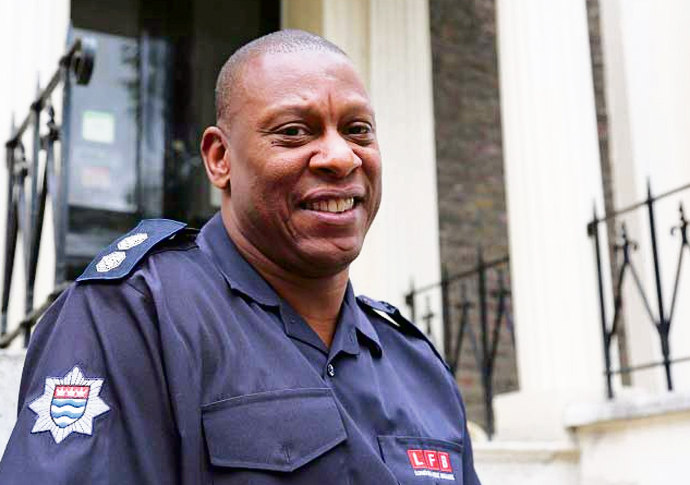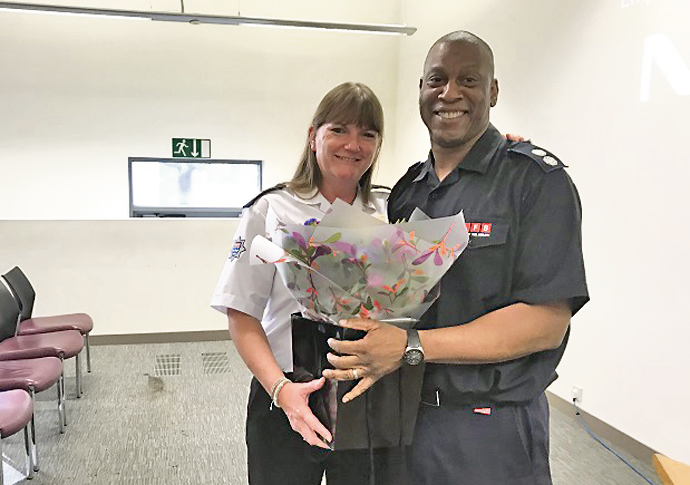Trailblazer Micky: I joined the brigade as a firefighter – and very quickly became a black firefighter
A story from the Black Trade Union Oral History Project
Friday, 3rd October 2025 — By Dan Carrier

Michael Nicholas
MICHAEL “Micky” Nicholas began his working life at the Post Office.
He joined the Communication Workers Union – and it was the beginning of a lifetime of union activism that saw him help tackle discrimination in public services.
Micky joined the London Fire Brigade in 1990 and became a key figure in the Fire Brigades Union.
His story has been recorded by a history project at London Metropolitan University, in conjunction with the Coalition of Black Trade Unionists (UK) and the TUC to record the lived experiences of black and minority ethnic trade unionists.
The Black Trade Union Oral History Project archive includes contributions from African, Africa-Caribbean and Asian trade union members who faced discrimination as they earned a living.
Mr Nicholas was a branch rep in the East End for the Post Office and when he joined the brigade there were not many black firefighters.
“I joined the fire brigade as a firefighter and very quickly you became a black firefighter, simply because there were not that many of you,” he told the archivists.
“When I joined the London Fire Brigade in 1990, at that time employing 8,000 operational staff, about 270 were non-white.”
Having been a CWU member and branch rep, he became an FBU member and then a shop steward.
“There was a role to take on and no one else really wanted to do it,” he says.
“Because of my trade union background, I had half a clue. But the other encouraging aspect was the FBU at the time was doing a lot of work around diversity and challenging discrimination.

Michael Nicholas was described as the UK’s most influential firefighter when he retired from the brigade in 2018
“To know that the union that I was a member of wanted to address that was quite an encouragement.
“The union had recognised that the experience of minorities in the fire service wasn’t great.”
For Mr Nicholas, who become a union leader, a Labour councillor in Lambeth and was awarded an MBE, the FBU played a pivotal role addressing a workplace culture that needed attention.
“The union was very aware of the issues that people were having. There was a culture of bullying and generally poor standards of behaviour. The union leadership at the time really started to grasp that and wanted to do something about it.”
In the past 30 years there has been a greater awareness of workplace discrimination and addressing these issues has often come from the “self-organisation of black trade unionists fighting for space within the formal structures of the trade union movement but self-organising to achieve this on the margins,” according to the archive.
By documenting and disseminating this history, the archive project aims to broaden understanding and highlight the role of black trade unionists, activists, and full-time officers.
For Mr Nicholas, working with the FBU to help counter workplace racism showed how with activism and involvement unions can make a real difference to forging a fairer world.
“What it meant to me – then, and now – is solidarity,” he says. “You know as workers in any environment you have a body and a movement that represents your interests and will support you while you work in that environment.
“They will keep you as safe as you need to be, especially in certain industries where health and safety is paramount. The union holds people to account.
“But what the union most importantly meant to me was representation and solidarity. There are things that, as a single person, you can’t fight for on your own. The union meant to me that collective representation.”